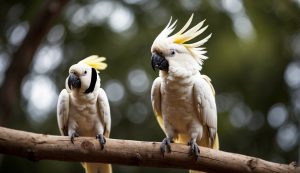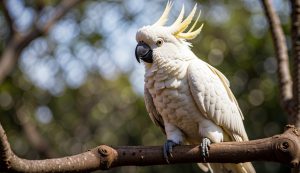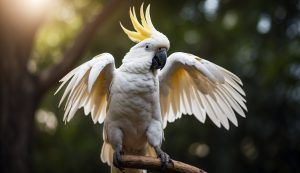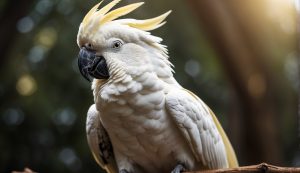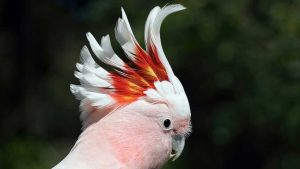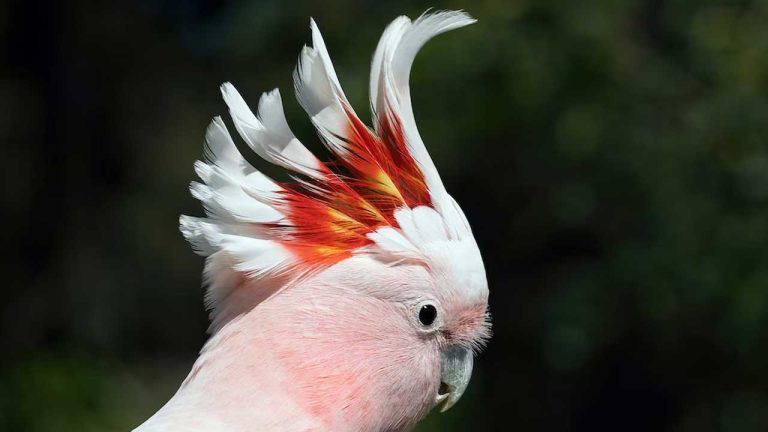Why Are Cockatoos So Loud? Unraveling the Mystery of Their Raucous Calls

Cockatoos are renowned for their vocal prowess. They are capable of producing an array of loud calls that can be heard from great distances. This characteristic isn’t just a random quirk; it serves a variety of important functions in the lives of these social birds.
In the wild, their calls play a crucial role in communication. They serve purposes like attracting mates, signaling danger, establishing territory, and maintaining flock cohesion.
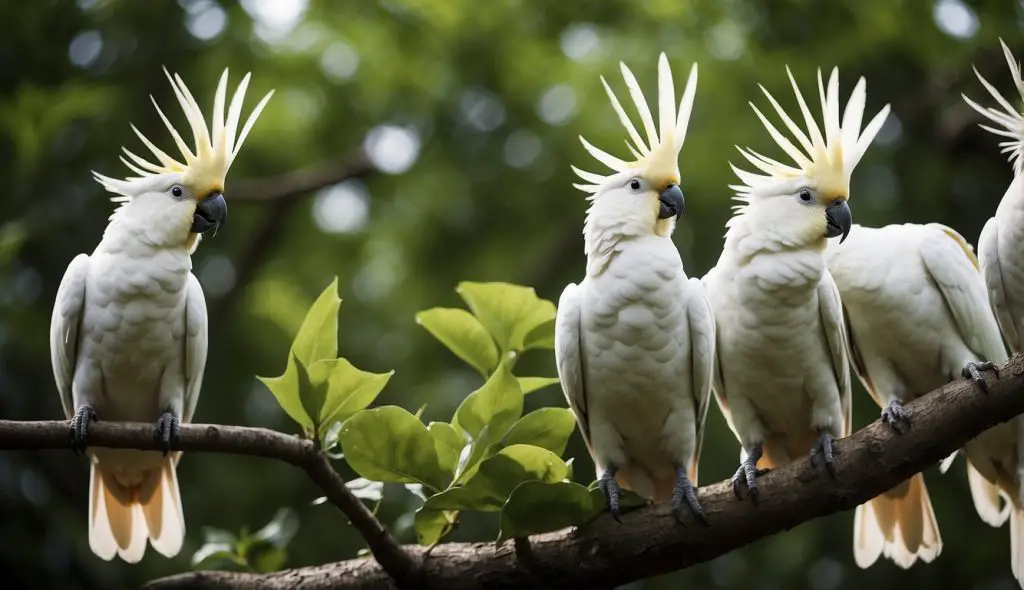
In the context of captivity, however, a cockatoo’s loudness can be a source of confusion and frustration for pet owners. Loud calls might indicate excitement, boredom, a need for attention, or distress.
Understanding the underlying reasons for a cockatoo’s vocalizations is crucial for providing proper care and maintaining a harmonious relationship between the bird and its human companions.
Key Points
- Cockatoos use loud calls to communicate effectively in the wild.
- Understanding why cockatoos are loud is vital for caring for them as pets.
- Identifying the causes of loud behaviors can improve the human-cockatoo bond.
Table of Contents
Understanding Cockatoo Behavior
When I explore cockatoo behavior, I notice their loudness isn’t just noise—it’s a complex form of communication and social interaction. Cockatoos use vocalizations to express a range of emotions, from happiness to stress.
Communication and Vocalizations
Cockatoos are naturally loud creatures. I understand this is mainly due to their vocalizations, which serve multiple purposes in the wild. Their calls help them communicate with their flock mates over long distances, relay alerts about predators, and establish their territory. I’ve noticed that these vocal patterns can vary widely, indicating that their calls are not only signs of their intelligence but also a key part of their unique personality.
Social Interactions and Attention Seeking
In my experience, cockatoos are incredibly social birds with a strong desire for interaction and attention. They often vocalize to initiate play or to demand affection from their human companions. Screaming, in this case, can sometimes be a behavior learned because it successfully captures the attention of the people around them. As I’ve observed, a happy cockatoo might make loud sounds when excited or when greeting someone familiar.
Signs of Stress or Discomfort
Finally, it’s crucial for me to understand that not all loud vocalizations are created equal. A cockatoo might scream due to anxiety, pain, or stress. Recognizing the signs of discomfort like a change in pitch or frequency of its call can help me assess their well-being. Changes in behavior, such as increased aggression or a sudden onset of loud sounds, might suggest that the cockatoo is dealing with some level of stress or discomfort.
Caring for Pet Cockatoos
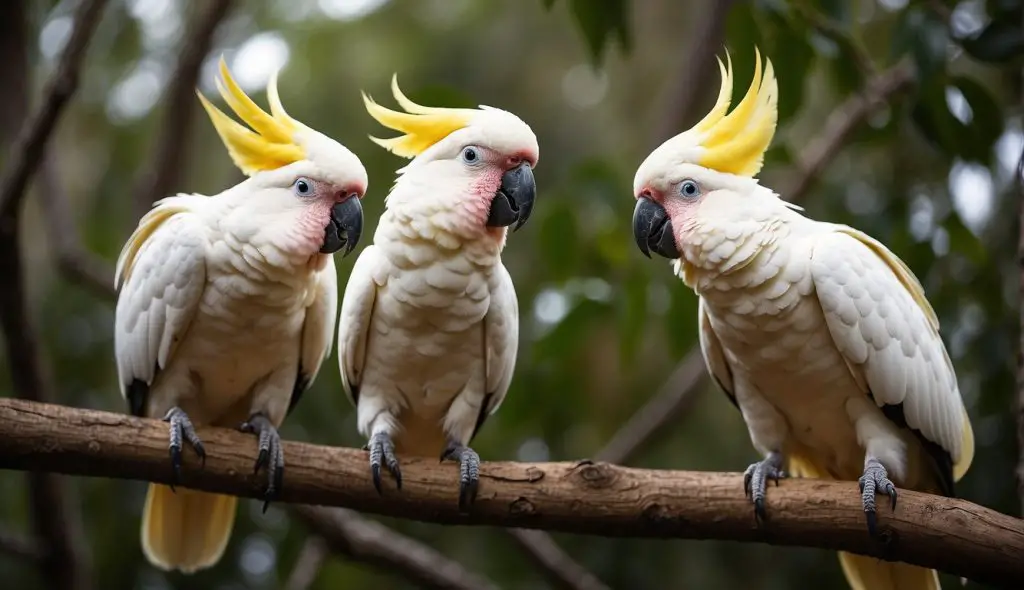
When owning a pet cockatoo, it’s crucial to focus on their diet, enrichment, and training. I understand the needs for a healthy and happy bird, so let’s explore the most effective care strategies.
The Importance of a Proper Diet
Pet cockatoos thrive on a balanced diet that consists of high-quality pellets, a variety of fresh vegetables, and occasional fruits. I ensure my cockatoo gets the nutrients it needs by:
- Pellets: These should make up about 60-70% of their diet.
- Vegetables: Fresh vegetables provide essential vitamins and should be about 20-30% of their daily intake.
- Fruits: Given sparingly, fruits are a sweet treat and should not exceed 10% of the diet due to sugar content.
Providing Adequate Stimulation
Cockatoos are intelligent and need regular stimulation to prevent boredom, which can lead to loud vocalizations. Here’s how I keep my cockatoo engaged:
- Toys: A variety of chewable toys encourages mental stimulation and satisfies their need to chew.
- Interaction: Regular one-on-one interaction helps maintain a strong bond and provides mental enrichment.
- Cage: The cage should be large enough for them to stretch their wings and play with their toys comfortably.
Training and Positive Reinforcement
Training my pet cockatoo with patience and consistency is gratifying for both of us. I use reward-based training to guide their behavior, including being quiet during certain times:
- Positive Reinforcement: I reward desired behaviors with treats or praise as immediately as possible.
- Training Sessions: I conduct short, consistent training sessions to avoid overwhelming the bird, which makes learning more effective.
Recognizing and Responding to Loud Behaviors
In this section, I’ll guide you on why cockatoos scream and how we can address excessive noise in a constructive way. These birds communicate at high volumes for various reasons and understanding these can help us create a calmer environment for them.
Identifying Reasons for Screaming
Cockatoos are naturally loud creatures, often using their voice to express needs and emotions. Reasons for loud vocalizations can include:
- Attention: Cockatoos may scream when they wish to be noticed by their owners or other birds.
- Stress: Environmental changes or discomfort can result in screams of frustration or anxiety.
- Loneliness: These birds are social animals and may scream when feeling isolated.
- Boredom: A lack of stimulation can cause cockatoos to scream more frequently.
It’s essential to observe your bird’s circumstances when the screaming occurs to accurately pinpoint the cause, as addressing the root of the issue is crucial in minimizing the noise.
Implementing Solutions to Minimize Noise
Once the reasons for screaming are understood, I can focus on solutions to encourage quieter behavior:
- Routine: Establishing a consistent schedule can reduce stress and boredom-related screaming.
- Environmental Enrichment: Providing toys and puzzles helps keep my cockatoo mentally stimulated and less prone to boredom.
- Social Interaction: Spending quality time with my bird can fulfill their need for attention and socialization.
- Ignoring Excessive Screaming: Negative reinforcement, like yelling or banging on the cage, can exacerbate the problem. It’s better to ignore these behaviors and reward quiet moments with attention.
Cockatoo Species and Their Sounds
When examining the sounds of cockatoos, I focus on two main aspects: the vocal range differences among the species and the specific behaviors associated with their vocalizations. Each species has its unique calling card in the form of their distinct sounds.
The Vocal Ranges of Different Species
Cockatoos, which are a type of parrot, have an impressive array of vocalizations. There are over 21 species of cockatoos, and they exhibit a wide range of sounds, from the soft calls of the cockatiel to the powerful screeches of the Moluccan cockatoo. For instance:
- Cockatiel: Gentle, with a quieter vocal range than larger cockatoos.
- Moluccan Cockatoo: Known for its incredibly loud and high-pitched calls.
- Umbrella Cockatoo: They have a loud and broad vocal range, able to mimic sounds and words.
- Galah: Has a range of softer chattering to piercing alarm calls.
- Citron-crested Cockatoos: Typically have a moderate volume with a varied repertoire of sounds.
| Species | Vocal Range Description |
|---|---|
| Cockatiel | Gentle, quieter |
| Moluccan Cockatoo | Very loud and high-pitched |
| Umbrella Cockatoo | Loud and broad, can mimic |
| Galah | Soft chattering to loud alarms |
| Citron-crested Cockatoos | Moderate volume, varied sounds |
Species-Specific Behavioral Traits
Behavioral traits of cockatoos are often closely linked to their vocalizations. For example:
- Moluccan Cockatoo: They may use their loud calls as part of their mating rituals or to establish territory.
- Macaws, which are not cockatoos but another type of parrot species, often use their loud calls in the wild to communicate across long distances.
- Cockatiels are more social and use their calls to stay in contact with their flockmates.
The Human-Cockatoo Relationship
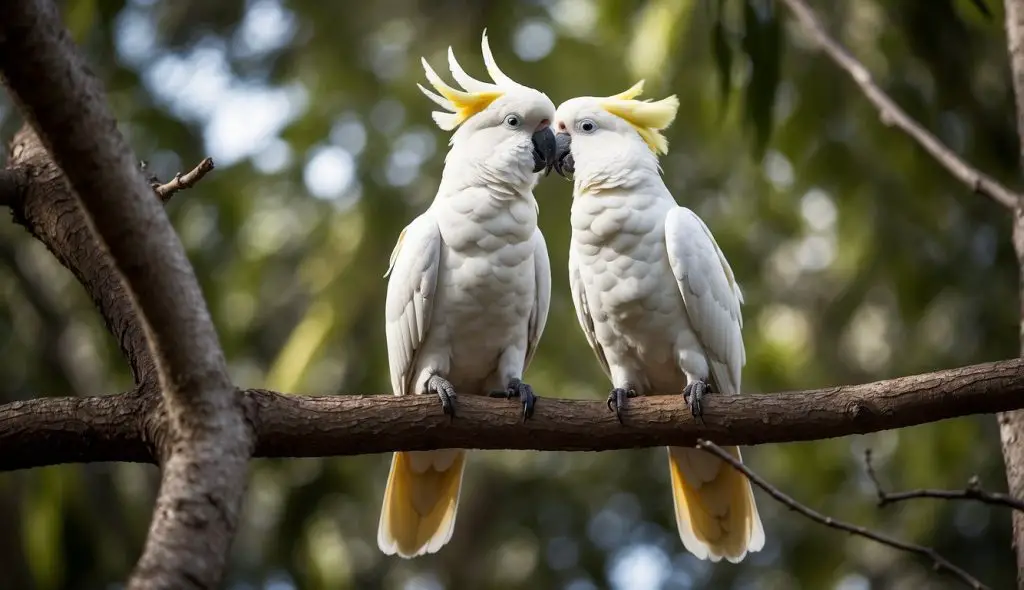
In my experience with cockatoos, the joy of our companionship is often punctuated by their vocal nature. The sounds range from sweet murmurs to loud calls that can rival the sound of a jet engine. Yet, these vocalizations are a core aspect of our fascinating relationship with these intelligent birds.
Creating a Bond with Your Cockatoo
I’ve found that bonding with a cockatoo involves consistent interaction and communication. My cockatoo responds favorably to daily routines that include talking and playtime.
An example of our routine is as follows:
- Morning Greeting (7:00 AM): “Good morning!” accompanied by a soft pat.
- Feeding Time (8:00 AM & 4:00 PM): A mix of seeds and fresh fruits.
- Playtime (5:00 PM): Puzzle toys to enhance mental stimulation.
By incorporating body language, such as gentle head nods and maintaining soft eye contact, I communicate my affection while respecting my cockatoo’s space. Cockatoos are highly affectionate and may exhibit signs like gentle nibbling to show their bonds with owners.
Understanding Noise in the Human Environment
The loud vocalizations of my pet are sometimes misinterpreted by my neighbors as nuisance noise. However, these sounds are a natural part of a cockatoo’s way to communicate and seek attention.
To mitigate any issues, I share the following steps with those living around me:
- Educate: I explain that cockatoos talk and mimic human words as a way of bonding with their humans.
- Schedule: Inform neighbors of my cockatoo’s noisy times to set appropriate expectations.
- Soundproofing: Use of acoustic panels in the room where my pet spends most of its time.
Frequently Asked Questions
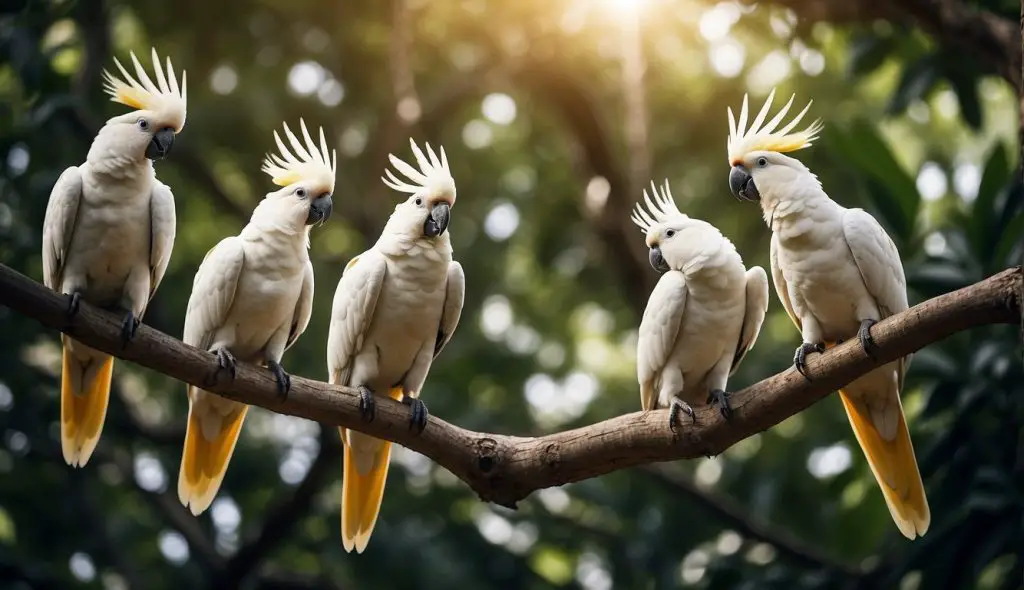
In my experience with these vibrant birds, I’ve noticed there are several factors that contribute to their characteristic loudness. Below, I address some common questions about their behavior.
What causes cockatoos to be especially noisy in the early hours of the day?
Cockatoos are naturally active and vocal at dawn, which is their way of signaling a new day and communicating with their flock. This behavior is rooted in their survival instincts, as it serves to establish territory and social connections.
Are there particular reasons why a cockatoo might scream or make loud noises during the night?
If a cockatoo screams at night, it may be due to a few reasons. These include lack of attention during the day, improper sleep patterns, or environmental factors like noise and lights. They need a calm and dark environment to sleep well.
Is there a reason cockatoos puff up their feathers?
When cockatoos puff up their feathers, they could be reacting to a variety of things such as temperature changes, attempting to appear larger to deter threats, or as part of their natural preening behavior.
What factors contribute to the energetic and seemingly erratic behavior of cockatoos?
Their energetic and active demeanor is part of their natural behavior. Cockatoos are highly intelligent and social creatures that require regular interaction and exercise to remain healthy and content.
Can you explain why cockatoos exhibit destructive behavior?
Cockatoos may engage in destructive behavior when they are bored or lack mental stimulation. It’s a manifestation of their intelligence and need for engagement, akin to their natural foraging habits in the wild.
What are the reasons behind a cockatoo’s loud vocalizations at nighttime?
While cockatoos are typically active during the day, they may vocalize at night if they sense danger or disruptions in their environment. It can be a response to potential threats or to seek attention if they feel lonely or stressed.


